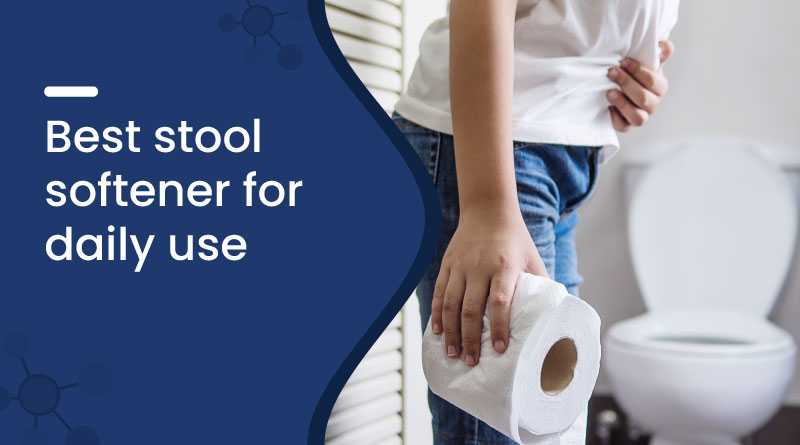Best Stool Softener For Daily Use


Hard stools, often dry and difficult to pass, result from insufficient water absorption in the colon, slow bowel movements, or diet. They develop when waste lingers, dehydrating further. For daily use, osmotic laxatives like polyethylene glycol are often recommended; they work by drawing water into the stool, making it softer and easier to eliminate. These are generally considered safe and effective for regular use without causing dependence.
How do hard stools form?
Hard stools form when waste moves too slowly through your large intestine, allowing it to absorb too much water. This dries out the stool, making it tough to pass. Factors like low fiber, dehydration, or lack of activity can cause this slowdown.
Benefits of a stool softener:
- Eases Bowel Movements: Stool softeners help make dry, hard stools smoother and simpler to pass, reducing strain and discomfort during trips to the bathroom.
- Prevents Constipation: By keeping stools soft, they help avoid new bouts of constipation, making regular bowel movements more achievable and comfortable.
- Reduces Pain/Strain: Less effort is needed to pass stools, which significantly lowers pain, cramping, and the risk of hemorrhoids or fissures from straining.
- Promotes Healing: For those recovering from surgery or with certain medical conditions, soft stools prevent pressure on healing areas, aiding recovery.
How does a stool softener work?
Stool softeners, like docusate, work by letting water and fats mix into your hardened stool. This makes the stool softer, easier to pass. Think of it like adding moisture to a dry sponge, making it pliable and less likely to cause discomfort when moving.
What are the stool softeners used for daily use?
| Product Name | Use |
|---|---|
| Lactolix Solution 100 ml | Used as a gentle stool softener. Helps relieve constipation and supports daily bowel movement without causing cramps. |
| Lactolix Solution 200 ml | Larger pack of Lactolix. Safe for regular use in managing constipation and promoting soft stools. |
How to use a stool softener?
- Read label directions carefully.
- Take with a full glass of water.
- Usually, take once daily.
- Don't chew or crush.
- Don't exceed the recommended dose.
- Effects may take days.
- Stop when stools soften.
- Consult a doctor if no improvement.
Which stool softener suits me?
Choosing the "best" stool softener depends on your specific needs. A gentle choice often used is docusate sodium. It helps put water into your poop, making it softer and easier to pass. See your doctor if any concerns.
When will I get relief from hard stools?
Stool softeners usually provide relief within 1 to 3 days after you start taking them. They work gradually by adding moisture to your stool, making it softer and easier to pass, not by forcing an immediate bowel movement.
Food to avoid for hard stools:
- Processed Foods: Low fiber, high fat; slows digestion.
- Dairy Products: Can be low in fiber and may cause issues for some.
- Red Meat: Greasy, little fiber; digests slowly.
- Fried Foods: Greasy and heavy; they slow down your system.
- Unripe Bananas: Contain starch, which can worsen constipation.
- White Bread/Rice: Lacks fiber and can harden stool.
- Sugary Treats: Often low in fiber; they contribute to sluggishness.
- Alcohol/Caffeine: Can dehydrate, making stools drier.
What lifestyle changes help prevent hard stools?
- Drink plenty of water daily. Hydration keeps stools soft and moving smoothly.
- Eat fiber-rich foods. Fruits, veggies, and whole grains add size to the bowel.
- Exercise regularly. Physical activity helps stimulate bowel movements.
- Listen to your body's urges. Don't delay going to the bathroom.
- Establish a routine. Try to poop at the same time.
- Manage stress effectively. Stress can impact your digestive system.
- Limit processed foods. They often lack fiber, contributing to hardening.
- Reduce dairy intake. Some find it can slow down their digestion.
When to see the doctor?
- No relief after a week.
- Severe stomach pain.
- Blood in your stool.
- Unexpected weight loss.
- Sudden bowel habit change.
- Constipation starts after a new medication.
- Feeling constantly bloated.
- Trouble passing gas.
What are home remedies for treating hard stools?
- Drink plenty of water. Hydration softens stools, making them easier to pass.
- Eat more fiber. Fruits, veggies, and whole grains add bulk.
- Prunes or prune juice. Natural laxative helps move things along.
- Warm liquids. Coffee or tea can stimulate bowel movements.
- Olive oil. Lubricates the intestines, aiding stool passage.
- Exercise regularly. Movement encourages bowel function.
- Squatting position. Helps align bowels for easier emptying.
- Abdominal massage. Gently rub the stomach to stimulate movement.
Which is the best stool softener for daily use?
For daily use, a gentle type of stool softener that helps draw water into the stool is often recommended. This kind works by hydrating and softening the stool, making it easier to pass without stimulating the bowels. It's considered suitable for regular use. The best stool softener is chosen based on your condition.
You can use Zeelab Laxmilk Syrup and Lactolix Solution for softening your stool and improving bowel movement. These medicines are available at the best prices.
Conclusion
Hard stools worsen if untreated. The best gentle daily stool softener works by drawing water into the bowel. Prevention involves fiber, hydration, and exercise. Awareness and knowing when to see a doctor. Choosing the right medicine, alongside lifestyle changes, ensures comfortable and regular bowel movements.
Frequently Asked Questions (FAQs):
Q: Can I take stool softeners every day?
A: Yes, you can take a stool softener daily but under medical guidance.
Q: When will the stool softener start working?
A: Stool softeners work gradually. It can take 1 to 3 days to show symptomatic improvement.
Q: When is the best time to take a stool softener?
A: Take the medicine at night after a meal, as it can take a few hours to work, and you can clean your stomach in the morning.
Q: Can we take a stool softener with other medicine?
A: Yes, you can take a stool softener with other medicines.
Q: Are there any side effects from daily stool softener use?
A: No severe side effects are generally seen; however, in a few cases, mild gastric distress can occur.
Recent Blogs
Disclaimer : Zeelab Pharmacy provides health information for knowledge only. Do not self-medicate. Always consult a qualified doctor before starting, stopping, or changing any medicine or treatment.
















 Added!
Added!